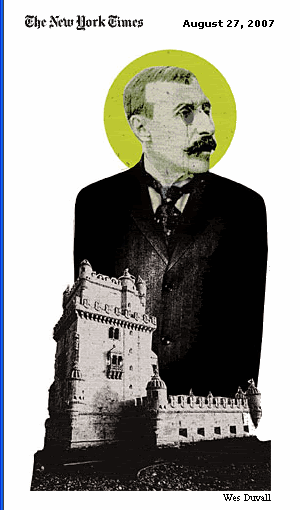Lisbon Story
By ALAN RIDING
Published: September 2, 2007
José Saramago, Portugal’s only Nobel literature laureate to date, describes “The Maias” as “the greatest book by Portugal’s greatest novelist.” Even so, its 19th-century author, José Maria Eça de Queirós, could use a bit more of an introduction. He may be Portugal’s Flaubert, but like the greatest novelists of many peripheral countries, he remains largely unknown to English-language readers. A new translation of “The Maias” offers an appealing chance to discover him.
Wes Duvall
Eça de Queirós (1845-1900) was part Naturalist, part Romantic.
THE MAIAS
Episodes From Romantic Life.
By Eça de Queirós. Translated by Margaret Jull Costa.
628 pp. New Directions. Paper, $17.95.
Related
First Chapter: ‘The Maias’ (September 2, 2007)
Born in 1845, Eça de Queirós (pronounced EH-sah de kay-ROSH) was the illegitimate son of a magistrate, whose support enabled him to study at Coimbra’s elite university. Moving to Lisbon in 1866, he joined a group of writers committed to seeking social reform through literature. Then, from 1872, he lived abroad, serving successively as Portuguese consul in Havana, Newcastle-upon-Tyne, Bristol and, finally, Paris, where he died in 1900.
Portuguese society was the target of his 12 novels, only five of which were published in his lifetime, yet Eça de Queirós was very much a cosmopolitan writer. Influenced by both Naturalism and Romanticism, he fearlessly dissected the social decadence of his day. The tools he used were a rich style, passion-driven storytelling and satire. As he saw it, late-19th-century Portugal was a backwater — and he implicitly blamed this on the monarchy, the Roman Catholic Church and the aristocracy.
“Here we import everything,” João de Ega, one of the principal characters in “The Maias,” caustically proclaims. “Ideas, laws, philosophies, theories, plots, aesthetics, sciences, style, industries, fashions, manners, jokes, everything arrives in crates by steamship.”
Eça de Queirós even pokes fun at Portuguese diplomats like himself, having one grande dame complain that “the number of dolts, dullards and nincompoops who represent us overseas is enough to make one weep.” And she adds: “This really is a most unfortunate country.”
“The Maias” must have seemed shockingly contemporary in its verismo: its narrative ends in 1887, just a year before the book was published. But it is not a revolutionary tract. Rather, in Margaret Jull Costa’s excellent translation, its appeal remains its strongly etched characters, not only the beloved and enlightened patriarch, Afonso da Maia, and his no-less-wealthy grandson, Carlos, but also assorted snobby aristocrats, drunken writers, greedy politicians, self-important businessmen, social climbers — and beautiful women.
Their principal stage is Lisbon, where at clubs, restaurants, parties, private dinners, even on the street, they argue about politics and literature, gossip poisonously and plan seductions. Indeed, the men devote enormous energy to bedding their associates’ wives. In Ega’s case, alas, the lovely Raquel Cohen’s husband finds out. Carlos, in contrast, soon tires of the Countess de Gouvarinho and “her tenacity, her ardor, her weight.”
The novel’s main plot gets going after Carlos falls for Maria Eduarda, the wife of a wealthy Brazilian, Castro Gomes, who is spending time in Lisbon. When Castro Gomes returns to Rio de Janeiro on business, Carlos makes his move, and Maria Eduarda, “divine in her nakedness,” responds with Flaubertian passion. “Her urgent kisses seemed to go beyond his flesh, to pierce him through, as if wanting to absorb both will and soul,” Eça de Queirós writes approvingly.
A frustrated suitor of Maria Eduarda strikes back, informing Castro Gomes in an anonymous letter of his wife’s betrayal. But when Castro Gomes returns to Lisbon, he has a surprise: he informs Carlos that Maria Eduarda is not his wife but his mistress, a woman with a steamy past whom he is quite glad to be rid of. Stunned, Carlos is also ready to dump her, but she wins him back, recounting the hardship of her life and persuading him of her undying love.
“Suddenly, all he saw, blotting out her every weakness, were her beauty, her pain, her sublimely loving soul. A generous delirium, a grandiose kindness mingled with his love. And bending down, his arms open to her, he said softly: ‘Maria, will you marry me?’ ”
Ah, those 19th-century Romantics.
Well, twists and turns lie ahead, but there is still ample time to dwell on the terminal ennui of these aristocratic Lisboners who seem to have no need to work. And it is their slow-moving world of vapid conversation and fear of change that Eça de Queirós most delightfully mocks. To Alencar’s revolutionary poetry, the Count de Gouvarinho can only tut-tut: “To speak of barricades and make extravagant promises to the working class at a society event, under the protection of the queen, and in the presence of a minister of the crown, is perfectly indecent!”
Gradually, then, while charting Carlos’s travails of the heart, Eça de Queirós paints a picture of a society trapped in a time warp, stubbornly refusing to follow the rest of Europe. And here, far more than Carlos, a sympathetic but spoiled rich boy, it is the unsuccessful writer Ega who seems to speak for the novelist. Ega loves Portugal, but is also unforgiving. “There’s nothing genuine in this wretched country now, not even the bread that we eat,” he laments in a form of conclusion.
Looking again at that remark, it is a bit surprising that Portugal still so loves Eça de Queirós. On the other hand, Portugal has changed: today, it really does belong to Europe.
Alan Riding, the former European cultural correspondent of The Times, is a co-author of “Opera.”
FONTE: NYTimes
quarta-feira, 27 de fevereiro de 2008
“The Maias” as “the greatest book by Portugal’s greatest novelist.”
Marcadores:
BOOK,
EÇA DE QUEIROZ,
IMAGENS,
José Maria Eça de Queiroz,
OS MAIAS
Assinar:
Comentários (Atom)
![Validate my Atom 1.0 feed [Valid Atom 1.0]](valid-atom.png)






















































